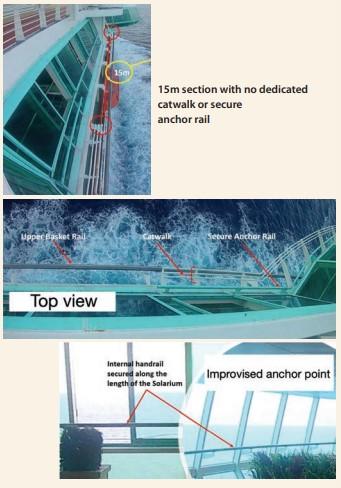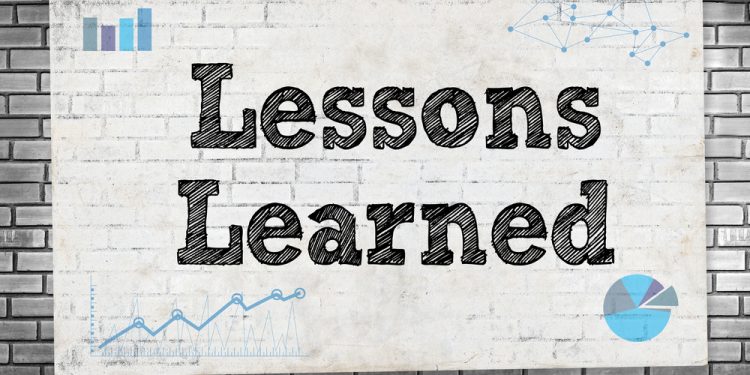As the Nautical Institute reports, on a passenger ship that was docked, five deck crew were window cleaning, a job they knew well and had done many times.
The incident
The windows were on deck nine, 30m above the sea. One crew connected his safety lines to the external securing rail and stepped outboard of the ship and onto the catwalk, followed by a second crew that did likewise. Meanwhile, three other members of the team assisted with moving, adjusting and connecting safety lanyards and strops and provided equipment to the two team members working outboard on the catwalk. Both crew members working over the side were provided with a full body harness and two energy absorbing lanyards with one hook connected to each lanyard. The procedure was to use the two-lanyard method when moving from point to point, so that one lanyard was always secured to an anchor point.
As the crew members progressed forward, they needed to undertake maintenance on windows in a 15m area without dedicated catwalk. To access this area, they connected their lanyards to the inboard handrail via a strop. They had to stand on top of the ‘upper basket rail’ which is designed to support and carry the weight of a maintenance basket and crew, but is not designed to be walked on. Attaching their harness to an improvised anchor point (the inboard handrail) via a strop was not considered unusual as it had been done on previous occasions. Suddenly, one of the crew fell backwards, clutching his strop and lanyard in one hand. Neither of his two lanyards were attached to an anchor point. He fell 30m and entered the water head first. He was seen to immediately start swimming to maintain buoyancy.
The alarm was immediately raised and a lifebuoy was thrown into the water from deck 10, followed shortly thereafter by two more from other decks. The victim was seen to make an attempt to swim towards the first lifebuoy, and then the second which was closer to him. Before reaching the second lifebuoy he was seen struggling with progressively slower strokes and some three minutes after his fall, he was no longer visible on the surface of the water.
Notwithstanding very quick action with rescue boats and even the onboard lifeguard swimming in the vicinity of the victim’s last known position, the victim was only found by divers two hours later, deceased.
The official investigation found many discrepancies in the way the vessel’s safety management system was executed. Among other things, the Permit to Work (PtW) and Job Safety Analysis (JSA) had been signed by the deck officer coming off watch, eight hours before the work began. Further, the officer signed a blank PtW and JSA without knowing fully the task to be conducted or the hazards presented. It appears the officer considered this ‘normal’ practice, and would do this on nearly all occasions when a PtW and JSA were required.
The victim was not wearing an approved flotation device, notwithstanding a procedure and PtW that specified wearing an approved flotation device when working outboard. It was accepted by all levels of the deck crew, from the Staff Captain to the Ordinary Seaman, that flotation devices were considered dangerous on account of the injuries that could be sustained on entering the water from any height. Additionally, wearing a flotation device was seen to restrict the wearer’s ability to move freely and was deemed very uncomfortable.
Further discrepancies included the lack of adequate external securing anchors and dedicated catwalks in the proximity of certain windows. This resulted in the deck crew having to connect to an improvised anchor point inside the frame of the window and walk on the ‘upper basket rail’. This arrangement also shortened the available reach of each worker so a temporary solution using strops was necessary. The strop had to be looped inside itself to provide an anchor point, increasing the risk of confusing the secure end of the strop with the loose end.
Lessons learned
- Working overboard without wearing an appropriate flotation device is extremely hazardous. Compact floatation devices that inflate upon contact with water could be more appropriate for working at height than voluminous floatation devices that restrict movement and could cause injuries when falling from tens of metres.
- Adequate resources should be made available to ensure experienced personnel oversee the maintenance procedures, ensuring all safety procedures are implemented and verified.
- When working at height, appropriately designed structures and equipment shall be in place to support and secure any individual.





























































